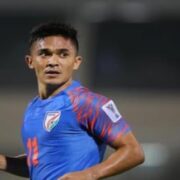As Indian football stands at a critical juncture, one of its most iconic voices has spoken — calm, composed, and urging unity amid rising concerns. Sunil Chhetri, the talismanic captain of the Indian national team and a long-time stalwart of the Indian Super League (ISL), has issued a heartfelt message in response to the growing uncertainty surrounding the 2025–26 ISL season.

Sunil-Chhetri-has-asked-for-people-involved-in-the-Indian-football-ecosystem-to-remain-calm
The Football Sports Development Limited (FSDL), the league’s organising body, sent a letter to all ISL clubs last Friday stating it was unable to “effectively plan, organise, or commercialise” the upcoming season due to unresolved issues surrounding the Master Rights Agreement (MRA) with the All India Football Federation (AIFF). This stunning development has cast a long shadow over the future of India’s top-tier football league, leaving clubs, players, fans, and stakeholders in a state of unease.
But amid the cloud of confusion, Sunil Chhetri’s voice has emerged as a beacon of clarity.
“Please stay calm”: Chhetri’s Emotional Appeal
In a video message released on social media late Tuesday night, Chhetri directly addressed fans, players, and everyone involved in Indian football. “I understand that everyone is worried, hurt, and scared. These are uncertain times for our league and for the football ecosystem in our country. But please, stay calm. We need to show maturity and patience,” said the 40-year-old Bengaluru FC forward.
Chhetri acknowledged that emotions were running high across the football community. “There are livelihoods at stake — players, coaches, club staff, even fans whose emotional investment is enormous. It’s not just about contracts or business decisions. It’s about the sport we love, and for many of us, it’s our life,” he said.
While he refrained from taking sides in the FSDL-AIFF standoff, Chhetri expressed hope that a resolution would be found soon. “I know both FSDL and AIFF have played key roles in getting Indian football to where it is today. I truly hope they find common ground. The ISL has been a crucial part of our journey, and it deserves to continue, stronger than ever.”
What Went Wrong?
The crisis was triggered by a deadlock in negotiations between FSDL and AIFF over the renewal of the Master Rights Agreement — the foundational legal and commercial framework that enables the operation of the ISL . According to reports, AIFF had been seeking a restructuring of the agreement to allow more autonomy and financial participation from the federation in league decisions, while FSDL reportedly raised concerns about the commercial viability of the current format.

FSDL-and-AIFF-over-the-renewal-of-the-Master-Rights-Agreement -the-foundational-legal-and-commercial-framework-that-enables-the-operation-of-the-ISL
In the letter sent to clubs, FSDL wrote, “We regret to inform you that we are currently unable to effectively plan, organise, or commercialise the ISL 2025-26 season until the uncertainties around the MRA are resolved.”
This message sent shockwaves across the Indian football community, especially as it came in mid-July — a time when most clubs are deep into pre-season preparations. Recruitment, training camps, player registrations, and sponsorship agreements have all been thrown into limbo.
Players and Clubs in a State of Flux
Several ISL clubs have already paused or scaled back their preseason activities. A few have put contract negotiations with foreign and domestic players on hold, while others have reached out to the AIFF seeking clarity.

Several-ISL-clubs-have-already-paused-or-scaled-back-their-preseason-activities
A senior official from an ISL club, speaking on condition of anonymity, said: “It’s a nightmare. Our planning has been thrown into disarray. We don’t know whether to proceed with our recruitment or hold off. Our sponsors are calling us daily, asking what’s going on. We have no answers.”
Young players, especially those trying to break into the professional ranks, are among the most affected. For many, the ISL and its reserve leagues represent the main pathway to professional football and national team selection. “This was supposed to be my breakthrough year,” said a 21-year-old forward who recently signed with an ISL club. “Now I don’t even know if I’ll have a league to play in.”
Impact on Indian Football’s Ecosystem
The ISL has played a transformative role in Indian football since its inception in 2014. It brought in better infrastructure, global coaching standards, enhanced media exposure, and attracted investment in grassroots development. The league’s rise coincided with increased national team success, including a string of Asian Cup qualifications and a notable improvement in FIFA rankings.

The-ISL-has-played-a-transformative-role-in-Indian-football-since-its-inception-in-2014
If the 2025–26 season is scrapped or delayed, it would be the first time in over a decade that Indian football would be without a fully functional top-tier league. The ramifications would be felt throughout the ecosystem — from grassroots academies and state leagues to broadcasters, sponsors, and fans.
“This is not just a business issue. It’s a sporting emergency,” said former India midfielder and current coach Renedy Singh. “We’ve made so much progress in the last ten years. Losing momentum now would be disastrous.”
AIFF and FSDL’s Positions
Both FSDL and AIFF have issued statements acknowledging the ongoing discussions but offered little clarity on a timeline for resolution.
The AIFF, in a brief statement, said: “We are in constructive dialogue with FSDL regarding the structure and operation of the ISL and other competitions. We remain committed to the growth of Indian football and hope to reach an agreement that benefits all stakeholders.”
FSDL, meanwhile, reiterated its long-standing commitment to Indian football and expressed optimism that the situation could be resolved. However, sources within the organisation suggest that unless a financially sustainable model is agreed upon soon, FSDL may consider stepping away from active league management — a move that would leave a gaping vacuum in Indian football.
What Happens Next?
The coming weeks are critical. The AIFF is expected to convene an emergency meeting with all stakeholders, including club owners, state associations, and FSDL representatives. There have also been calls for intervention by the Sports Ministry to mediate and ensure that the ISL — or an alternative top-tier league — proceeds as planned.

The-AIFF-is-expected-to-convene-an-emergency-meeting-with-all-stakeholders-including-club-owners-state-associations-and-FSDL-representatives
In the meantime, Chhetri’s message has struck a chord with many in the footballing fraternity. Former players, club administrators, and fans have widely shared his video, praising his maturity and leadership.
“I’ve seen Indian football through its highs and lows,” Chhetri said. “This is a low, yes. But we’ve come through worse. What matters is how we respond — with unity, resilience, and above all, hope.”
A Nation Awaits
For millions of fans who have followed Chhetri’s journey from a young prodigy to India’s greatest football ambassador, his words are more than just a call for calm — they are a reminder of what the sport means to the nation.
As uncertainty continues to swirl around the ISL’s future, one thing remains clear: Indian football, with its heart still beating strong in the form of leaders like Chhetri, will not give up without a fight.
Until a resolution is reached, the community waits, holding its breath — and its hope.
Click here to watch more!



















Comments